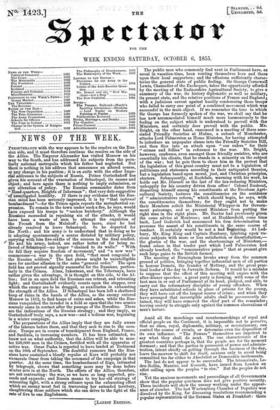The public men who commonly find vent in Parliament have,
as usual in vacation-time, been venting themselves here and there upon their local supporters; and the effusions sufficiently charac- terize the general state of public feeling. Sir George Cornewall Lewis, Chancellor of the Exchequer, takes the opportunity afforded by the meeting of the Radnorshire Agricultural Society, to give a summary of the war, its history diplomatic as well as military, its present state, and the relative positions of France and England with a judicious caveat against hastily condemning those troops who failed to carry one point of a combined movement which was successful in the main object. If we remember the tone in which Sir George has formerly spoken of the war, we shall say that he has now accommodated himself much more harmoniously to the feeling on the subject which is understood to prevail with the Ministers, and certainly does prevail with the public. Mr. Bright, on the other hand, ensconced in a meeting of three asso- ciated Friendly Societies at Hulme, a suburb of Manchester, attacks Lord Palmerston as Home Minister, for having attempted to introduce an unpopular clause into the Friendly Societies Bill, and then flies into an attack upon " our rulers" for their " crimes and follies" in reference to the war. Mr. Bright, however, confesses, even amongst those friendly societies, who are essentially his clients, that he stands in a minority on the subject of the war ; but he gets them to cheer him in the protest that the legislation of this great country must not be a legislation of politicians and statesmen according to their antiquated theories, but a legislation based upon moral, just, and Christian principles, etcetera. Subsequently, at Rochdale, warming with his work, he holds out Mr. Disraeli as the last of the tax-reducing Ministers, unhappily for his country driven from office! Colonel Rushout, disporting himself among his constituents at the Evesham Agri- cultural Society, lectures the constituencies on the accidence of " administrative reform," which should begin, he says, with the constituencies themselves ; for they ought not to make their Members solicit the Ministerial Whipper-in for Govern- ment patronage, and so prevent Ministers from putting the right man in the right place. Mr. Baxter had previously given the same advice at Montrose; and at Huddersfield, some time back, Lord Goderich had announced his firm determination to presume the assent of his constituents in the same course of conduct. It certainly would be not a bad beginning. At Led. bury, Mr. King King and Captain Hanbury, touching upon va- rious subjects with more or less satisfaction or dissatisfaction,— the glories of the war, and the shortcomings of Ministers,— found solace in that tender part which Lord Palmerston had already touched, the "remunerative prices" that at present give such large gains to the British farmer.
The meeting at Birmingham breaks away from the common ground of politics, bringing together influential men of all parties to honour Demetz, the founder of Mettray, and the great prac- tical leader of the day in Juvenile Reform. It would be a mistake to suppose that the effect of this meeting will expire with the after-dinner speeches : a great party is forming, with some of the best men in or out of Parliament at its head, pledged, and able, to carry out the reformatory discipline of young offenders. When they have substituted schools in place of prisons for the young, they will have cut off the largest source of crime ; and when they have arranged that incorrigible adults shall be permanently de- tained, they will have removed the chief part of the remainder; leaving society to struggle only against the common aberrations of man's nature.


























